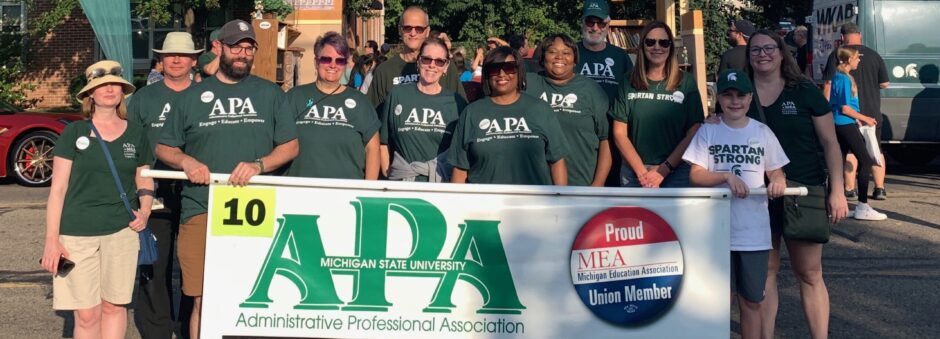Submitted by Shannon Alston, MEA/APA UniServ DirectorÂ
Please note that the following is not intended to be construed as legal opinion, I am not advising you in a legal capacity, and the laws referred to could be subject to change prior to enactment. The information below is not a substitute for the advice of legal counsel.  Â
On August 14, 2020, a change in the law surrounding Title IX will take effect and it will impact MSU’s handling of complaints of relationship violence, sexual misconduct and stalking. As a result, MSU is drafting an updated policy. Once the new version of MSU’s policy is finalized, it will likely be posted on the MSU website and be made readily available to all employees and students. I encourage everyone to review those policies when they become available as they provide detailed information on how the Office of Institutional Equity (OIE) and Title IX Coordinator deal with complaints about relationship violence, sexual misconduct and stalking. In the meantime, I would like to share a couple changes that may impact you whether you are a Complainant (accuser) or a Respondent (accused).  Â
One of the most significant changes, in my opinion, is that once a matter becomes a formal complaint (one that has been reduced to writing and signed), it must progress through all of the steps of the investigation process INCLUDING the holding of a hearing. In the past, a hearing was only required if at least one of the parties (Complainant or Respondent) wished to have a hearing. Now it will be mandatory.  Please note that only a formal complaint triggers this requirement.   Up until the time that the complaint becomes formal, there is generally no requirement that it progress to a hearing stage.  Furthermore, a complainant should still be able to choose to drop a complaint at any time before it reaches a hearing stage.  Unfortunately in that situation there is not a final determination because the complaint has been dismissed prior to the hearing.  The one exception is that a Title IX investigator can choose to file a formal complaint and continue it through the hearing process without a Complainant’s signature if the university knows or reasonably should have known that prohibited conduct was occurring in violation of the policy.  Â
Another change to the law is that the Respondent will now be presumed “not responsible†for violation of the policy until there has been a determination, based on the preponderance of the evidence, that it is more likely true than not that the Respondent is responsible. The burden of proving responsibility will be on the university.   Â
Most of the other changes in the law do not impact MSU’s process for dealing with these matters because the process used by MSU is already in compliance with those changes.Â
The most important thing that you should take away from this article though is not about the changes to the law, it is that APA members are never alone in these matters.  Â
If you feel that you are a victim of relationship violence, sexual misconduct, or stalking, you can contact the following resources to discuss reporting options, the formal complaint process and to get support in confidence:Â
MSU Center for Survivors https://centerforsurvivors.msu.edu/Â
MSU Employee Assistance https://eap.msu.edu/Â
MSU Counseling and Psychiatric Services (CAPS)Â https://caps.msu.edu/Â
MSU Safe Place http://safeplace.msu.edu/Â
University Ombudsperson https://ombud.msu.edu/index.htmlÂ
Of course, you can also contact your APA to provide support to you as a victim and/or defend you as a Respondent in these matters. However, I would like to caution members that while we, as your representatives, keep our discussions with you confidential, there is no legal right to confidentiality between you and your APA leader or between you and your MEA UniServ Director. We could be compelled to testify as to the content of our conversations with you in a court of law. This is particularly relevant if you are a Respondent and the actions that you are being “accused†of amount to criminal behavior. In such a case, you should tell us this when contacting us for assistance, without including details, so that we can request criminal representation for you.Â
Lastly, I would like to say that using the formal complaint process through the university is not the only means of dealing with the issues of relationship violence, sexual misconduct and stalking. In many cases you might also consider involving the police, contacting an outside agency (such as the EEOC) or contacting an attorney to discuss other legal options. Â
Â
Â
  Â
Â
Â
